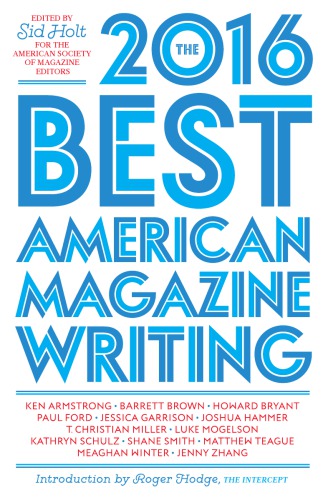

Most ebook files are in PDF format, so you can easily read them using various software such as Foxit Reader or directly on the Google Chrome browser.
Some ebook files are released by publishers in other formats such as .awz, .mobi, .epub, .fb2, etc. You may need to install specific software to read these formats on mobile/PC, such as Calibre.
Please read the tutorial at this link: https://ebookbell.com/faq
We offer FREE conversion to the popular formats you request; however, this may take some time. Therefore, right after payment, please email us, and we will try to provide the service as quickly as possible.
For some exceptional file formats or broken links (if any), please refrain from opening any disputes. Instead, email us first, and we will try to assist within a maximum of 6 hours.
EbookBell Team

5.0
60 reviewsThis year's Best American Magazine Writing features outstanding writing on contentious issues including incarceration, policing, sexual assault, labour, technology, and environmental catastrophe. Selections include Paul Ford's ambitious "What Is Code?" (Bloomberg Businessweek), an innovative explanation of how programming works, and "The Really Big One," by Kathryn Schulz (The New Yorker), which exposes just how unprepared the Pacific Northwest is for a major earthquake. Joining them are Meaghan Winter's exposé of crisis pregnancy centres (Cosmopolitan) and a chilling story of police prejudice that allowed a serial rapist to run free (the Marshall Project in partnership with ProPublica). Also included is Shane Smith's interview with Barack Obama about mass incarceration (Vice).
Other selections demonstrate a range of long-form styles and topics across print and digital publications. The imprisoned hacker and activist Barrett Brown pens hilarious dispatches from behind bars, including a scathing review of Jonathan Franzen's fiction (The Intercept). "The New American Slavery" (Buzzfeed) documents the pervasive exploitation of guest workers, and Luke Mogelson explores the purgatorial fate of an undocumented man sent back to Honduras (New York Times Magazine). Joshua Hammer harrowingly portrays Sierra Leone's worst Ebola ward as even the staff succumb to the disease (Matter). And in "The Friend," Matthew Teague's wife is afflicted with cancer, his friend moves in, and the result is a devastating narrative of relationships and death (Esquire). The collection concludes with Jenny Zhang's "How It Feels," an unconventional meditation on the intersection of teenage cruelty and art (Poetry).